Retailers
Retailer’s announcement relaunches price war into 2016 while CEO Andy Clarke says ‘radical and logical action’ is needed
Asda has invested £500 million in further price cuts in the first major move this year for price war between the top four retailers and discounters.
Chief executive Andy Clarke said the business must take “radical action” to win back customers and said he expects 2016 to be another year of intense pressure.
The investment into prices comes on top of the £1 billion over five years Asda said it would invest into price in November 2013. It is part of Project Renewal – a two-year programme within Asda’s five-year strategy to reinforce its value proposition.

The news comes as Asda also announced it has joined European buying alliance EMD, which will help develop the company’s own-label range. EMD is made up of 14 national buying structures and pools the collective buying power of 250 supermarket chains.
EMD membership will help develop a “radical shake-up” of its approach to buying, Asda said, and alongside leverage from IPL it will be able to “release significant savings from its supply chain”.
Clarke said: “Asda is unquestionably the UK’s lowest price full range supermarket business and we intend to strengthen that position. Indeed, we reaffirmed this as 2016 began when we became the first retailer to cut unleaded and diesel prices below £1.
“The structure of UK grocery retailing has permanently changed to reflect the way that customers shop today. Being part of Walmart also gives us insight into similar trends in the rest of the world and it’s clear that this is a global phenomenon.”
Clarke said Asda saw the change coming and responded in 2013 but “didn’t move fast enough”. “There is currently no growth in the food market and the rise of the limited assortment discounters means that we must take radical action to win back our customers. Today, from our strong financial position, we are taking another bold step forward in our five year strategy,” he said.
“Fundamentally changing how we buy products means we can realise significant savings from our cost base and pass these directly to customers through a rebased pricing model. Joining forces with the huge EMD network of 250 European supermarkets will give us significant economies of scale. We’ll continue to work with our suppliers to lower costs in our supply chain and return sales to growth in partnership.
“But we are not complacent. We remain cautious and, as the chancellor warned on Thursday, we expect that 2016 will be another year of intense pressure at a macro-economic level in addition to sales remaining under strain from price deflation, a continued competitive background throughout the sector and radically changing customer shopping habits.”
Alongside the price cuts, Asda will also invest in 95 of its largest stores to make them “more relevant”, removing “fringe ranges” and investing in own-label.
Clarke continued: “We know our customers better than anyone else and we need to structure our offer to meet their changing needs. This knowledge has shaped our plans to make our bigger stores easier to shop, laying them out in a way that’s relevant to today’s customers by removing fringe, marginal ranges, significantly investing in our own label ranges and providing services that they need.”
He warned that industry faces “more turbulence” in the short-term, but insisted that in the long-term he has the “right and winning strategy”.
“We expect that 2016 will be another year of intense pressure at a macroeconomic level, in addition to sales remaining under strain from price deflation, a continued competitive background throughout the sector, and radically changing customer shopping habits,” Clarke said.
The news comes as both Aldi and Lidl begun 2016 by reducing the price point of select promoted fresh produce items from 39p to 29p. Trading figures for the key Christmas period are due this week (w/c 11 January) for several of the major retailers, with Asda due to report in mid February.
Going forward, M&S has planned and targeted to concentrate on increasing food sales
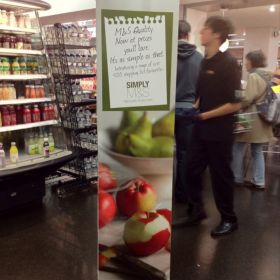
Sales at Marks & Spencer have fallen for the six months to the 26th of September.
UK like-for-like sales fell by 0.4% for the period, and while sales of general merchandise, which includes the clothing division, were down by 1.2%, food sales rose by 0.2%.
The retailer said underlying profits rose by 6.1% to £284 million, although after taking into account one-off items, pre-tax profit fell 22.7% to £216m.
Those one-off items included almost £27m on revamping UK stores and £22m on European store costs.
M&S noted that it plans to concentrate on increasing food sales, gross margins and cash generation.
Salvatore Genovese-grown hot chilli measures 1.4 million Scovilles and is available in Tesco stores until November
Tesco has launched what it claims is the “hottest-ever commercially-grown” chilli pepper into stores this week.
The Komodo Dragon chilli – which measures up to 1.4 million Scoville units – is grown for Tesco by the UK’s largest chilli grower, Salvatore Genovese, based in Blunham, Bedfordshire.

In comparison, a jalapeno pepper used in many pizza toppings measures 3,500 Scovilles, while the very hot Scotch Bonnet is rated up to 350,000 Scovilles, Tesco said.
Komodo Dragon chillis are now on sale in 500 stores in 15g packets sold for £1.
“In recent years we’ve had the fearsome Dorset Naga, the searing Bhut Jolokia and the mouth-numbing Trinidad Scorpion,” said Tesco chilli buyer, Eleanor Mansell. “But they all pale in comparison to the UK’s latest commercially-grown chilli pepper – the mighty Komodo Dragon which puts the others in the shade.”
Mansell said the Komodo Dragon is unusual because it has a delayed reaction that “lulls you into a sense of false security”.
“At first you can taste a wonderful hot fruitiness but then after about 10 seconds the full might of this little demon hits you and your whole mouth is aglow,” she said. “This is definitely a chilli pepper for connoisseurs and for those who are experienced in eating really, superhot food.”
Grower Genovese, who started growing chilli peppers about 15 years ago (after he took over his parents’ cucumber business), said hot chillis are the one that create the most interest. “So each year I try and grow one hotter than the last. I have chilli heads, as they’re known, contacting me from all over the world asking for samples,” he said.
“The Komodo Dragon should be livening up meal times over the coming months. I’d seriously advise anyone not experienced in eating really hot chilli peppers to have some milk or yoghurt ready as a standby to douse the flames.”
Genovese grows about one million chillis, or 15 tonnes, each week, on his seven-acre farm. Komodo Dragon chilli peppers will be available in Tesco until November.
Supermarkets need to shut stores to save costs, as price cuts are ‘not enough’ to fend off competition from discounters
Retailers must shut down one in five of their stores in order to turn around flagging sales figures and reboot the grocery market, a report has said.
A large-scale closure programme is the “only viable solution” to return to profitable growth for the major supermarkets, the study found, and said price cuts alone will not win the battle against hard discounters Aldi and Lidl.
“We believe that any major price investments by Morrisons, Sainsbury’s or Tesco can be exceeded by the discounters,” said analyst Rob Joyce of report authors Goldman Sachs.

The report found that as over half of Tesco’s stores are bigger than 40,000 sq ft, the UK’s largest retailer will have the biggest problem.
And it said that multiple supermarkets would suffer like-for-like sales declines of three per cent a year until 2020, unless they begin to close stores.
“Our analysis of the UK grocery industry suggests capacity exit is the only viable solution for a return to profitable growth,” the report said.
The latest grocery share figures from Kantar Worldpanel, published today for the 12 weeks ending 9 November 2014, show that all the top four retailers have lost market share, while Aldi and Lidl have grown (up 25.5% and 16.8% respectively).
Fraser McKevitt, head of retail and consumer insight at Kantar, said: “The declining grocery market will be of concern to retailers as they gear up for the key Christmas trading season. The fight for a bigger share of sales has ignited a price war which means an average basket of everyday goods such as milk, bread and vegetables now costs 0.4% less than it did this time last year. This is bad news for retailers, but good news for shoppers with price deflation forecast to continue well into 2015.”
Sainsbury’s has announced a £150m investment in price cuts as it revealed a 2.1% fall in like-for-like sales.
Sainsbury’s released its interim results for the 28 weeks ending 27 September 2014, showing underlying profit before tax down 6.3% to £375m from £400m in 2013/2014. Underlying basic earnings per share were also down significantly, by -12.7% to 14.5p compared with 16.6p in 2013/2014.
The supermarket, alongside Tesco, Asda and Morrisons, has been hard-hit by the success of discount brands Aldi and Lidl.
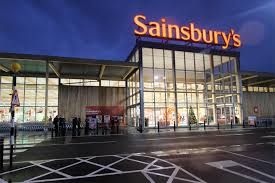
To combat this, Sainsbury’s said it would invest £150m in reducing prices, half of which will fall in the second half of 2014/15 and the remainder in the first half of 2015/16.
Moreover, Sainsbury’s stated it would work closely with its suppliers to provide lower prices for it customers and “deliver value chain efficiencies which can be reinvested in price”.
Chief executive Mike Coupe said Sainsbury’s would continue to put customers first: “We will continue to differentiate ourselves from a position of strength by offering great products and services at fair prices, investing in the quality of our food and investing in price in areas where our customers tell us it matters most. By knowing our customers better than anyone else, we will continue to serve them through multiple channels and in ways that make their lives easier, regardless of changes in the market. Our colleagues will remain our greatest asset; we will invest in their training and development to ensure they can continue to deliver industry-leading service.”
David Tyler, chairman, said: “The UK grocery sector has become increasingly challenging in recent months. As a result, we have evolved our strategy and believe this will allow us to build on our heritage and past success, especially as it will be delivered by the most experienced management team in the industry.”
High-street chain sets sights on joining discount grocery market with drive to increase fresh produce supply base
Discounter 99p Stores may become the next contender in the flourishing discount sector after stating it is set to expand its supply base for fresh produce.
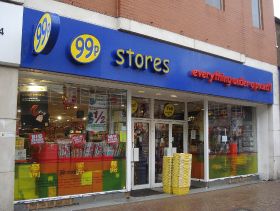
The high-street budget retailer said a recent apple promotion, which sold 10,000 packs in 10 days, shows there is “massive demand” from customers for produce.
“Currently we are working with a small group of suppliers with a view to expanding our supplier base,” said chief operating officer, Tony Brown.
“Our research is showing, more and more suppliers are looking to the discount market for next phase of growth outside the normal supermarket channel. Their research shows that discount channel is the fastest growing sector in retail and appeals to all UK customer types.”
Brown said the chain is currently trialling a range of top-selling fresh produce products, and is looking to extend its range of popular products that are in-season as well as all-year favourites.
He added: “We are working on building our fresh chilled business which is growing rapidly and we are finding that all the top brands are happy to be sold in our chillers.”
Retailer’s attempts to fund overseas expansion has come at a cost, according to retail expert professor Chris Edger
One retail expert has claimed that, in the wake of today’s news regarding Tesco’s drop in profit and sales through the first half of the year, the UK-based retailer has lost the trust of its customers.
Professor Chris Edger, business and retail expert from Birmingham City University (BCU), has said that Tesco has suffered when compared with the competition.
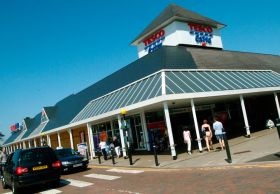
“Essentially, over the last six years, as Tesco has milked its UK business to fund foreign adventures it has – as the CEO has remarked – lost the trust of customers” says Professor Chris Edger, business and retail expert from BCU.
Professor Edger claims that the main downfall for Tesco has been the lack of transparency in regards to its pricing strategy.
“Back in the day, customers felt that they were – on balance – getting great value from Tesco on their food purchases,” he says. “However, the Hi-Lo strategy it has pursued over recent times, bouncing products in price to both ends of the spectrum, has led to confusion amongst customers.
“Asda, on the other hand has – it can be argued – been far more transparent and consistent on pricing; regularly winning The Grocer’s weekly basket price challenge and transmitting an honest message (which is backed up with action) to its customers on value.
“In terms of direct competition Asda, (more latterly) Morrisons and the hard discounters shout EDLP (everyday low price) in a transparent manner,” he says. “They are not opaque, in the sense, they hike-crash-hike again or use loyalty points systems as a confusing tactic to give customers the perception of value. No, they are fighting on straight transparent pricing platforms. And that is where Tesco needs to regain the trust of its customers.”
‘We want to show support to Brit growers while giving customers a great range to choose from,’ declares retailer’s fruit buyer
The Co-operative Food is planning to sell Red Tractor-approved British apples in more stores than any other retailer this season.
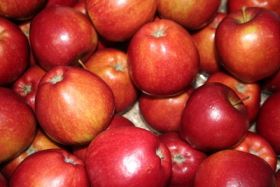
Carla Mills, fruit buyer at The Co-operative Food said: “This year’s bumper crop of great quality fruit will help us to showcase some of the traditional favourites much loved by our customers. Traditional British varieties such as Discovery, Galmac, Early Windsor, Red Windsor, Spartan, Worcester, Wellant, Cameo, Scrumptious, Egremont Russet, Red Pippin, and Red Falstaff will all be sold in our Co-operative Dessert Apple pack, and will change variety as the season progresses.
“With their unique flavour and perfumed scent, many of the older British varieties are now hard to come by, and their short season should be celebrated, and enjoyed whilst available. These varieties will join classic favourites Cox and Gala, Braeburn and of course Bramley.
She added: “We want to show our support to our British apple growers whilst giving customers a great range of British apples and pears to choose from.”
Tesco sold more English apples and pears in 2013-14 than any other retailer, according to an independent industry league table.
Discount retailer’s like-for-like sales also up 30% in 2013, driving pre-tax profits up 65.2% to £261m
Aldi saw its sales grow 35.7% to £5.3 billion in 2013.
Like-for-like sales were up 30%, meanwhile, driving pre-tax profits up 65.2% to £261m.
The retailer’s UK bosses, Matthew Barnes and Roman Heini, told The Daily Telegraph that the German retailer had emerged as the new “consumer champion”, that it is benefiting from a “lack of trust” in traditional supermarkets, and that its sales have actually been boosted by the price war among the ‘big four’ retailers.

The news comes as Sainsbury’s is expected to post a fall in like-for-like sales on Wednesday (1 October), while Tesco is reeling from a trio of profit warnings and the discovery of a £250m black hole in its accounts.
Barnes told the Telegraph: “As the price war has begun, our sales, market share and growth have accelerated. Customers have become so much more sceptical since the recession about the grocery market in terms of value, transparency, and special offers.
“They have been bamboozled by a price reduction from a very high level to a low level, and yet that low level is still more expensive than Aldi.
“I think that has enabled us to stand out as a bit of a shining light. You can call us a consumer champion in that respect. Customers have come to see Aldi as a business they can trust, potentially in a market where there is very much a lack of trust.”
According to the newspaper, Aldi is attracting one million more customers than a year ago. The average customer is also buying more items, with Aldi recording an average basket size of 16.9 items, ahead of 16.6 at Tesco, but behind 18.8 at Asda.
Despite this increase, the average amount spent at Aldi is £18.99 – still 22% less than the £24.37 average spend at Tesco.